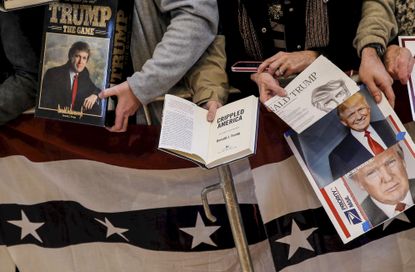Did you vote for Donald Trump? Then you're not actually a Republican.
At least not as the party has defined itself for several decades


In the days since Donald Trump gave his rivals for the Republican nomination a double-digit thumping in the South Carolina primary, the bulk of political commentary has focused on the horse race. What will happen in Tuesday's Nevada caucuses? And what about in the pile of states voting on March 1? When will Ben Carson and John Kasich drop out? If Marco Rubio hopes to catch Trump, he'll have to win something soon. But where? Can Ted Cruz prevail anywhere besides Iowa and his home state of Texas?
Those are all interesting and important questions. But they shouldn't distract us from the bigger picture of what's happening right before our eyes — which is nothing less than the implosion of the Republican Party.
Consider: In the week leading up to the South Carolina primary, Donald Trump...
Subscribe to The Week
Escape your echo chamber. Get the facts behind the news, plus analysis from multiple perspectives.

Sign up for The Week's Free Newsletters
From our morning news briefing to a weekly Good News Newsletter, get the best of The Week delivered directly to your inbox.
From our morning news briefing to a weekly Good News Newsletter, get the best of The Week delivered directly to your inbox.
... unambiguously attacked the last Republican president for his decision to launch the Iraq War.
... parroted left-wing conspiracy theories about how this same president lied in making his case for the war.
... flatly asserted that "torture works."
... endorsed a policy of committing war crimes by telling the (apocryphal) story of how an American general massacred 49 Muslims a century ago in the Philippines using bullets dipped in pigs' blood (as an extra offense against Islamic law, which bans contact with swine).
... reiterated his promise to build a wall along the southern border of the United States to keep out Mexican immigrants — and added that he'd name the barrier the "Trump Wall."
... spoke positively about ObamaCare's individual mandate.
... denounced as "bad guys" a series of leading conservative commentators, including Karl Rove, George Will, Steven Hayes, and Charles Krauthammer.
And then one-third of South Carolina Republicans gave Donald Trump their votes.
Let me put this as clearly and straightforwardly as I can: A Republican Party in which a third or more of the voters are ready and willing to vote for such a candidate is not the same party that elected Ronald Reagan, George H.W. Bush, and George W. Bush, or that chose John McCain and Mitt Romney as its standard-bearer.
But the situation is even more dire than that — though members of the Republican establishment and mainstream conservative movement are trying very hard to deny it.
Most of these willful optimists insist that Trump will soon fade, with Rubio surging to the head of the delegate pack. This prediction isn't completely delusional. Trump's success can't be disentangled from his great good fortune in running against such a sharply divided field. Trump has yet to crack the mid-30s in support, and his ceiling is unlikely to go much higher than that, with the non-Trump candidates dividing the remaining 60-something percent of the vote amongst themselves. In a two-man race, it becomes quite likely that the sole non-Trump option would prevail.
But when it comes to the future of the Republican Party, this doesn't much matter — because we now know that roughly one-third of the party has gone rogue. In the short term, this raises the question of what these rogue voters will do in November if Trump isn't the nominee. Is it likely they will show up to vote for Rubio, the candidate ideologically closest to George W. Bush? I think that's highly unlikely, and that it could doom the non-Trump Republican nominee this year, no matter who it ends up being.
But more ominous for Republicans is the longer-term.
How can the GOP continue to push the same agenda when one-third of the party wants it to make a radical break from its past and stand for something fundamentally different? Trump outflanks the party from the right on immigration and terrorism, outflanks it from the left on taxes, benefits, and a range of other domestic policy issues, and ridicules just about everyone else in the party for their rank stupidity and for contributing to a decline in the country that he alone can reverse.
A third of Republican voters endorse this profoundly anti-Republican message.
As I've argued before, that appears to leave two possible paths forward for the GOP. One is for the party as a whole to shift ideological direction to appeal explicitly to the rogue third of the party — though that could easily alienate a good portion of the party's other two-thirds. And that leaves the second option, which is for the party to break apart, with the rogue Republicans forming the base of some new party.
The path that leads to the second option would probably involve Trump failing to win the nomination this year and bolting from the GOP to form a third party — or Trump or some other political opportunist doing something similar in 2020.
Lest Democrats succumb too quickly to schadenfreude at the prospect of the GOP breaking into two and clearing a path to landslide victories for the Donkey Party, they should ponder a couple of recent New York Times stories on Trump's appeal to a "certain kind of Democrat" — namely, a working-class white Democrat with strong union ties. To test the thesis of these articles, Democrats should watch closely during upcoming open primaries to see how many Dems cross over to vote for Trump.
If the number comes to anything more than a trivial amount, that would open up a chilling possibility: that the ethnic-nationalist third party emerging from the GOP could draw support from the Democrats as well, effectively redrawing the ideological and demographic shape of both major parties.
That could herald the most significant change in the American political system — and inaugurate a period of greater political instability — than this country has seen in a very long time.
There's a reason why the old saying about living in interesting times is described as a curse.
Sign up for Today's Best Articles in your inbox
A free daily email with the biggest news stories of the day – and the best features from TheWeek.com
Damon Linker is a senior correspondent at TheWeek.com. He is also a former contributing editor at The New Republic and the author of The Theocons and The Religious Test.
-
 Is academic freedom in peril?
Is academic freedom in peril?Today's Big Question Faculty punishments are on the rise
By Joel Mathis, The Week US Published
-
 Quincy Jones, music icon, is dead at 91
Quincy Jones, music icon, is dead at 91Speed Read The legendary producer is perhaps best known as the architect behind Michael Jackson's 'Thriller'
By Peter Weber, The Week US Published
-
 Moldova's pro-West president wins 2nd term
Moldova's pro-West president wins 2nd termSpeed Read Maia Sandu beat Alexandr Stoianoglo, despite suspicions of Russia meddling in the election
By Peter Weber, The Week US Published
-
 US election: who the billionaires are backing
US election: who the billionaires are backingThe Explainer More have endorsed Kamala Harris than Donald Trump, but among the 'ultra-rich' the split is more even
By Harriet Marsden, The Week UK Published
-
 US election: where things stand with one week to go
US election: where things stand with one week to goThe Explainer Harris' lead in the polls has been narrowing in Trump's favour, but her campaign remains 'cautiously optimistic'
By Harriet Marsden, The Week UK Published
-
 Is Trump okay?
Is Trump okay?Today's Big Question Former president's mental fitness and alleged cognitive decline firmly back in the spotlight after 'bizarre' town hall event
By Harriet Marsden, The Week UK Published
-
 The life and times of Kamala Harris
The life and times of Kamala HarrisThe Explainer The vice-president is narrowly leading the race to become the next US president. How did she get to where she is now?
By The Week UK Published
-
 Will 'weirdly civil' VP debate move dial in US election?
Will 'weirdly civil' VP debate move dial in US election?Today's Big Question 'Diametrically opposed' candidates showed 'a lot of commonality' on some issues, but offered competing visions for America's future and democracy
By Harriet Marsden, The Week UK Published
-
 1 of 6 'Trump Train' drivers liable in Biden bus blockade
1 of 6 'Trump Train' drivers liable in Biden bus blockadeSpeed Read Only one of the accused was found liable in the case concerning the deliberate slowing of a 2020 Biden campaign bus
By Peter Weber, The Week US Published
-
 How could J.D. Vance impact the special relationship?
How could J.D. Vance impact the special relationship?Today's Big Question Trump's hawkish pick for VP said UK is the first 'truly Islamist country' with a nuclear weapon
By Harriet Marsden, The Week UK Published
-
 Biden, Trump urge calm after assassination attempt
Biden, Trump urge calm after assassination attemptSpeed Reads A 20-year-old gunman grazed Trump's ear and fatally shot a rally attendee on Saturday
By Peter Weber, The Week US Published